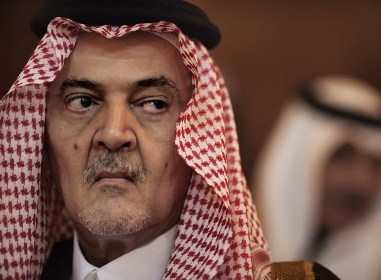Saudi Warns of Challenge of Yemen Violence

Sunni-dominated Saudi Arabia has warned that neighboring Yemen risks sliding towards further violence which could damage regional security, after Shiite rebels overran the capital last week.
Prince Saud al-Faisal, the kingdom's Foreign Minister, called at the United Nations for immediate implementation of a U.N.-brokered peace deal which he said had been flouted by the insurgents, local media reported on Monday.
The rebels advanced from their stronghold in northwestern mountains to the capital Sanaa last month, then seized key state installations with little or no resistance on September 21.
Under the peace deal signed that same day, they are supposed to withdraw once President Abdrabuh Mansur Hadi names a new prime minister.
"The Republic of Yemen is facing a situation which is developing in an extremely serious way and which requires us to come together to meet this unprecedented challenge," Prince Saud was quoted as saying in remarks at the U.N. General Assembly in New York.
He cautioned that if a solution is not found, Yemen "could slide towards more violence" liable to affect regional and international security.
"We call on all the parties to urgently apply the accord in its totality and we exhort the international community to help Yemen by all means possible," Prince Saud said.
Saudi Arabia and other countries of the Gulf back Yemen's President Hadi, a Sunni who has warned of "foreign plots" against his country.
It was a reference to Iran, which Yemeni authorities have repeatedly accused of backing the Huthi rebels, who also appear influenced by Lebanon's powerful Tehran-backed Shiite militia Hezbollah.
Also known as Ansarullah, the rebels have battled the government for years, complaining of marginalization.
The violence has added to instability in Yemen since an uprising that led to the ouster of autocratic president Ali Abdullah Saleh two years ago.
The peace deal aimed to put the post-Saleh transition back on track in impoverished Yemen, a key U.S. ally in the fight against Al-Qaida.
It appears the majority of Yemenese are Shia, just as it is the case in Lebanon. France finds difficulty in explaining why democracy is good for French but bad for other people. This reminds us that France, as its name suggests (from Frank; the German name for France is Frankreich), is a Germanic state with a Latin facade, and, although German tribes pioneered democracy alongside of ancient Romans and Greeks, it was always only for tribe-members, not for those they conquered. Since from about 1000 AD Germanic tribes became entirely dependent on raiding ("viking") for social stability, we have the historical record before us--and carrying forward--of the "dark ages", then "re-born", then "enlightened", and finally "modern democratic" Europe spending five hundred years (and counting) trying to conquer Asia. Some Lebanese have a sufficient sense of time and place to understand this pattern.



